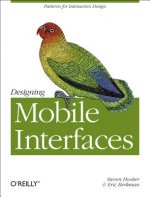
Kód: 02443307
Socio-technical Design of Ubiquitous Computing Systems
Autor Klaus David, Kurt Geihs, Jan Marco Leimeister, Alexander Roßnagel
By using various data inputs, ubiquitous computing systems detect their current usage context, automatically adapt their services to the user s situational needs and interact with other services or resources in their environment o ... celý popis
- Jazyk:
 Angličtina
Angličtina - Vazba: Pevná
- Počet stran: 353
Nakladatelství: Springer International Publishing AG, 2014
- Více informací o knize

Mohlo by se vám také líbit
-

Advances in Knowledge Management
3289 Kč -

Apollo 11
657 Kč -

Messenger
195 Kč -

Masnawi Sacred Texts of Islam: Book One
858 Kč -

Football For Dummies (UK Edition)
675 Kč -

Little Mermaid Stained Glass Coloring Book
130 Kč -

Messi
483 Kč -

Glamorous Actress
769 Kč -

Irish Fairy Tales
116 Kč -

Fashion and Armour in Renaissance Europe
909 Kč -

Quilt A Gift For Little Ones
494 Kč -

Augustus
410 Kč -

Legend Land, Volume 2 Being a Collection of Some of The Old Tales Told in Those Western Parts of Britain Served by The Great Western Railway
658 Kč -

Atlas of Lymph Node Pathology
8898 Kč -

A Game of Thrones: The Story Continues
1942 Kč -

Higurashi When They Cry: Massacre Arc, Vol. 2
580 Kč -

Not Gay
799 Kč -

Milk and Honey
272 Kč -

Let it Snow
158 Kč -

Creative Haven Nordic Designs Collection Coloring Book
389 Kč -

The Penalty Box
293 Kč
Dárkový poukaz: Radost zaručena
- Darujte poukaz v libovolné hodnotě a my se postaráme o zbytek.
- Poukaz se vztahuje na celou naši nabídku.
- Elektronický poukaz vytisknete z e-mailu a můžete ihned darovat.
- Platnost poukazu je 12 měsíců od data vystavení.
Více informací o knize Socio-technical Design of Ubiquitous Computing Systems
Nákupem získáte 151 bodů
 Anotace knihy
Anotace knihy
By using various data inputs, ubiquitous computing systems detect their current usage context, automatically adapt their services to the user s situational needs and interact with other services or resources in their environment on an ad-hoc basis.§Designing such self-adaptive, context-aware knowledge processing systems is, in itself, a formidable challenge. This book presents core findings from the VENUS project at the Interdisciplinary Research Center for Information System Design (ITeG) at Kassel University, where researchers from different fields, such as computer science, information systems, human-computer interaction and law, together seek to find general principles and guidelines for the design of socially aware ubiquitous computing systems. To this end, system usability, user trust in the technology and adherence to privacy laws and regulations were treated as particularly important criteria in the context of socio-technical system design.§During the project, a comprehensive blueprint for systematic, interdisciplinary software development was developed, covering the particular functional and non-functional design aspects of ubiquitous computing at the interface between technology and human beings. The organization of the book reflects the structure of the VENUS work program. After an introductory part I, part II provides the groundwork for VENUS by presenting foundational results from all four disciplines involved. Subsequently, part III focuses on methodological research funneling the development activities into a common framework. Part IV then covers the design of the demonstrators that were built in order to develop and evaluate the VENUS method. Finally, part V is dedicated to the evaluation phase to assess the user acceptance of the new approach and applications.§The presented findings are especially important for researchers in computer science, information systems, and human-computer interaction, but also for everyone working on the acceptance of new technologies in society in general.§
 Parametry knihy
Parametry knihy
Zařazení knihy Knihy v angličtině Computing & information technology Computer science Human-computer interaction
1509 Kč
- Plný název: Socio-technical Design of Ubiquitous Computing Systems
- Autor: Klaus David, Kurt Geihs, Jan Marco Leimeister, Alexander Roßnagel
- Jazyk:
 Angličtina
Angličtina - Vazba: Pevná
- Počet stran: 353
- EAN: 9783319050430
- ISBN: 3319050435
- ID: 02443307
- Nakladatelství: Springer International Publishing AG
- Hmotnost: 6682 g
- Rozměry: 235 × 155 × 25 mm
- Datum vydání: 29. July 2014
Oblíbené z jiného soudku
-

This is Service Design Doing
976 Kč -

Don't Make Me Think, Revisited
945 Kč -

About Face - The Essentials of Interaction Design, 4e
1216 Kč -

Rocket Surgery Made Easy
910 Kč -

Mapping Experiences
1086 Kč -

Quantifying the User Experience
1451 Kč -

Microinteractions: Full Color Edition
782 Kč -

Simple and Usable Web, Mobile, and Interaction Design
795 Kč -

UX Book
2331 Kč -

Bottlenecks
1081 Kč -

Calm Technology
518 Kč -

Information Visualization
2107 Kč -

Interaction Design: Beyond Human-Computer Interaction, Fifth Edition
2277 Kč -

Data Structures & Algorithms Interview Questions You'll Most Likely Be Asked
782 Kč -

Practical UX Design
1233 Kč -

Forms that Work
1631 Kč -

Bootstrap
531 Kč -

Usable Usability - Simple Steps for Making Stuff Better
943 Kč -

UX Strategy
976 Kč -

Practical Tableau
1524 Kč -

UI UX Design
1776 Kč -

Information Architecture, 4e
1248 Kč -

Evil by Design - Interaction design to lead us into temptation
795 Kč -

Art of Borderlands 3
1081 Kč -

Interview Techniques for UX Practitioners
707 Kč -

Cognitive Biases in Visualizations
3271 Kč -

Designing with Data
976 Kč -

Tao of Microservices
1474 Kč -

Complex Network Analysis in Python
962 Kč -

Designed for Use 2e
982 Kč -

Mobile User Experience
1230 Kč -

Neural Circuits and Networks, 1
3289 Kč -

OPC Unified Architecture
2204 Kč -

Introduction to Parallel Processing
6536 Kč -

Microsoft Power BI Cookbook
1713 Kč -

Researching UX: User Research
860 Kč -

Designing Mobile Interfaces
1153 Kč -

Universal UX Design
1833 Kč -

Introducing Ethereum and Solidity
1772 Kč -

Human-Computer Interaction
2804 Kč -

Tragic Design
782 Kč -

RxJava for Android Developers
822 Kč -

Augmented Reality in public spaces. Basic Techniques for video mapping
1109 Kč -

Security of Industrial Control Systems and Cyber Physical Systems
1665 Kč -

UX for the Web
1233 Kč -

Auditing and GRC Automation in SAP
6848 Kč -

Guide to TCP/IP
2895 Kč -

Modular Design Frameworks
946 Kč -

Artificial Intelligence and Games
1024 Kč
Osobní odběr Praha, Brno a 12903 dalších
Copyright ©2008-24 nejlevnejsi-knihy.cz Všechna práva vyhrazenaSoukromíCookies



 Vrácení do měsíce
Vrácení do měsíce 571 999 099 (8-15.30h)
571 999 099 (8-15.30h)